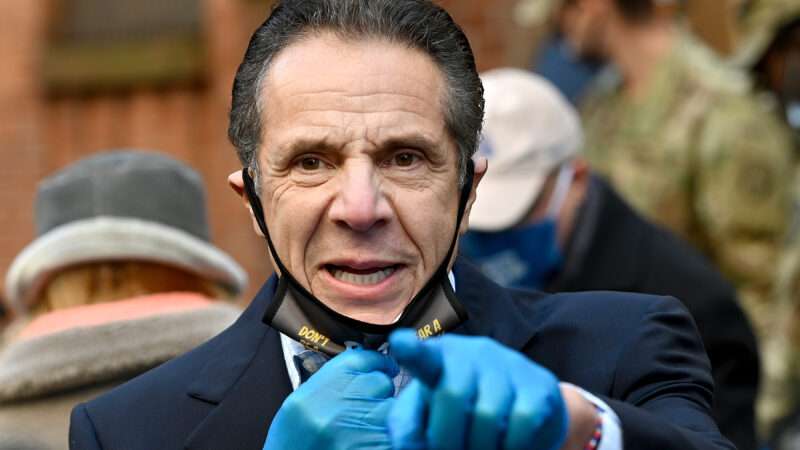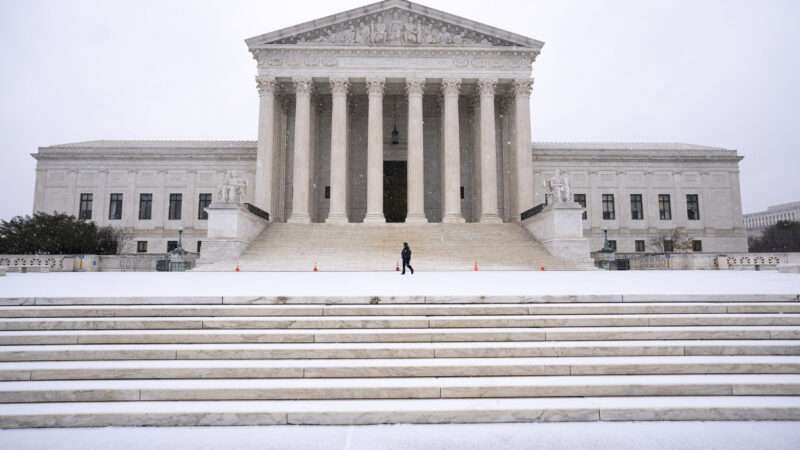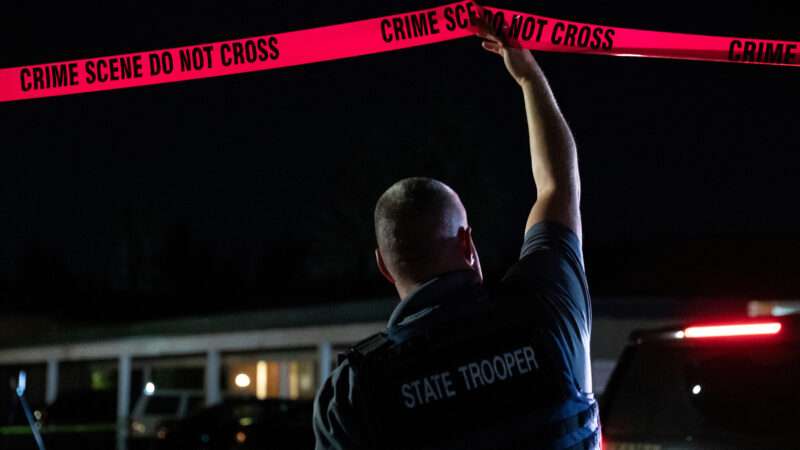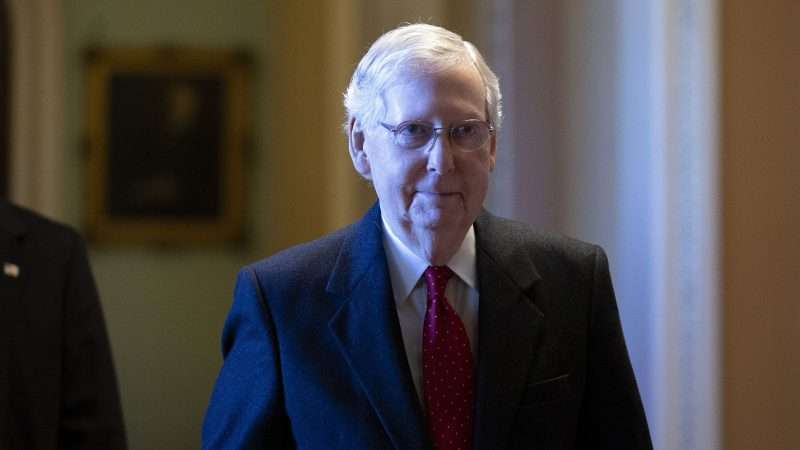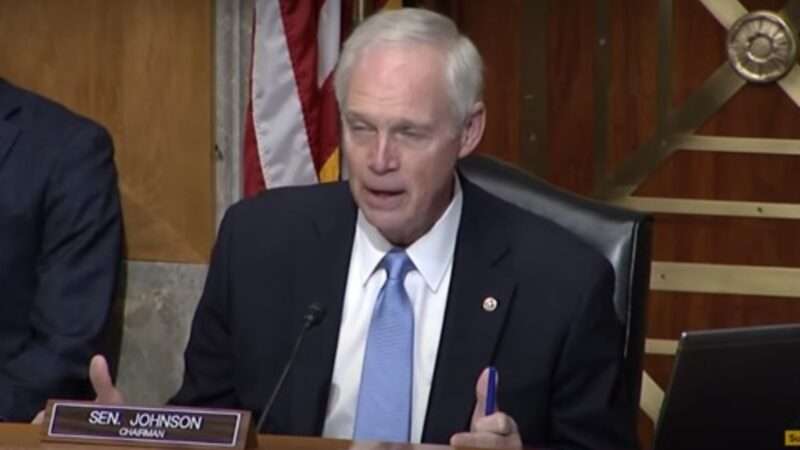
At the beginning of his hearing on election “irregularities” yesterday, Sen. Ron Johnson (R–Wis.) tried to lower expectations for Republicans who still think systematic fraud delivered a phony victory to President-elect Joe Biden. Johnson, who convened the hearing as chairman of the Senate Homeland Security and Governmental Affairs Committee, was also responding to critics, including ranking committee member Gary Peters (D–Mich.), who warned that Johnson was lending credence to that fanciful conspiracy theory.
“We will hear testimony on how election laws in some cases were not enforced and how fraudulent voting did occur, as it always does,” Johnson said. “The question that follows is whether the level of fraud would alter the outcome of the election this year. In dozens of court cases, through the certification process in each state and by the Electoral College vote, the conclusion has collectively been reached that it would not.”
That position represents quite a turnaround for Johnson, a steadfast Trump ally who as recently as last week was suggesting that he might support an electoral vote challenge aimed at preventing Biden from taking office. “It depends,” he told reporters last Thursday. “I need more information. The American people need more information. I’m not ready to just close and slam the book on this thing and go ‘OK, let’s walk away from it.'”
Johnson is now ready to close the book on the outcome of the 2020 presidential election, although he still has concerns about some of the ways in which it was conducted. Those concerns were detailed by several witnesses at the hearing, only one of whom alleged fraud sufficient to give Biden electoral votes that Trump should have received. That witness, Trump campaign lawyer Jesse Binnall, relied on evidence that was decisively rejected by Nevada courts.
Former Solicitor General Kenneth Starr, who oversaw the Whitewater investigation as an independent counsel during the Clinton administration, aired a couple of familiar complaints about the election in Pennsylvania. “One Pennsylvania judge concluded that state law required poll watchers to be present (within six feet) in order to meaningfully to observe the ballot-counting process,” he noted. “In Philadelphia, election officials had indisputably violated this pro-integrity measure.” He also noted a much-criticized Pennsylvania Supreme Court decision that extended the deadline for absentee ballots.
Republicans may have a legitimate beef about those practices, especially the second one. But even valid complaints about election procedures do not necessarily have outcome-changing implications. Keeping poll watchers farther than six feet away, while it may invite suspicion, does not prove that anything illegal was going on, and the number of late-arriving absentee ballots in Pennsylvania was too small to change the outcome in that state.
Francis Ryan, a Republican state representative from Pennsylvania, likewise complained about the extension of the mail-in voting deadline, along with two other decisions by the Pennsylvania Supreme Court that authorized the use of drop boxes for absentee ballots and said ballots should not be rejected based on signature comparisons. Ryan also noted the state’s policy of allowing voters to fix errors on their absentee ballots. The Trump campaign argued that uneven adoption of that policy violated the 14th Amendment’s Equal Protection Clause because it put Republicans at a disadvantage—a claim that was rejected in scathing terms by a federal judge and the U.S. Court of Appeals for the 3rd Circuit.
Trump campaign attorney James Troupis highlighted disputes about election procedures in Wisconsin, including the treatment of absentee ballot witness certificates with incomplete addresses and the question of which voters qualified as “indefinitely confined” (meaning they did not have to submit copies of their IDs when they applied for absentee ballots) in light of the COVID-19 epidemic. Those issues, along with the controversy over Wisconsin’s use of drop boxes, hinge on reasonable disagreements about statutory interpretation. But last Saturday, a Trump-appointed federal judge in Wisconsin rejected the president’s argument that the Wisconsin Elections Commission’s decisions on these matters flouted state law and therefore violated the Constitution.
The only witness who actually alleged decisive election fraud was Binnall, who claimed that comparisons of Nevada voter lists with commercially available databases had identified “over 130,000 unique instances of voter fraud.” According to Binnall, that total included 42,000 people who voted more than once, “more than 19,000 people” who “voted even though they did not live in Nevada,” “over 15,000 votes” that “were cast from commercial or vacant addresses,” “about 8,000 people” who “voted from non-existent addresses,” “at least 1,500 dead people” who were “recorded as voting,” and “almost 4,000 non-citizens who also voted.”
If 130,000 people really did vote illegally in Nevada, that would be more than enough to swing the contest for that state’s six electoral votes, which Biden won by a margin of about 33,600. Yet in response to a question from Sen. James Lankford (R–Okla.), Binnall conceded that the rampant voter fraud he described has not led to a single prosecution:
Lankford: In my state, when someone votes twice—and we do have that occasionally, about 50 times a year, that that actually occurs in our state—we prosecute individuals that vote twice. Of [these] 130,000 instances that you have identified from the 2020 election in Nevada, do you know of any prosecutions currently going on in Nevada for any voter fraud?
Binnall: Not yet, senator.
When the Trump campaign asked a Nevada judge to overturn the state’s election results based on these fraud claims, he concluded that its evidence was not credible. To back up its allegations, the Trump campaign submitted a deposition of Jesse Kamzol, formerly the Republican National Committee’s chief data officer. “The Court questions Mr. Kamzol’s methodology because he had little to no information about or supervision over the origins of his data, the manner in which it had been matched, and what the rate of false positives would be,” Carson County Judge James Russell wrote. “Additionally, there was little or no verification of his numbers.”
The defense’s expert witnesses, whom Russell deemed more credible, said the Trump campaign’s methodology was dubious and described its claims as highly implausible in light of historical experience and academic research on voter fraud. Russell also noted that one of the campaign’s experts “testified that he has no personal knowledge that any voting fraud occurred” in Nevada’s election. “Based on this testimony,” the judge said, “the Court finds that there is no credible or reliable evidence that the 2020 General Election in Nevada was affected by fraud.”
On December 4, Russell dismissed the Trump campaign’s lawsuit with prejudice, and the Nevada Supreme Court unanimously upheld that decision four days later. “The district court’s order thoroughly addressed the grounds asserted in the statement of contest filed by appellants and considered the evidence offered by appellants even when that evidence did not meet the requirements under Nevada law for expert testimony…or for admissibility,” the court said. “Despite our earlier order asking appellants to identify specific findings with which they take issue, appellants have not pointed to any unsupported factual findings, and we have identified none.”
According to Trump’s conspiracy theory, Democratic election officials across the country resorted to manufacturing phony absentee ballots after their original plan, which involved switching Trump votes to Biden votes with nefarious election software, did not work as expected. Christopher Krebs, who ran the Department of Homeland Security’s Cybersecurity and Infrastructure Security Agency (CISA) until Trump fired him in a fit of pique on November 17, addressed the plausibility of that claim in his testimony before Johnson’s committee.
Krebs described the steps that CISA had taken to improve election security prior to this year’s vote and reiterated the CISA-endorsed conclusion that the 2020 election was “the most secure in U.S. history.” He noted that CISA had repeatedly tried to correct misinformation about machine-facilitated voting fraud.
“As we moved on from Election Day, we began to see wild and baseless domestic
claims of hackers and malicious algorithms that flipped the vote in states across the country, singling out election equipment vendors for allegedly having ties to deceased foreign dictators,” Krebs said. “None of these claims matched up with what we knew about the facts. The allegations being thrown around about manipulation of the equipment used in the election are baseless. These claims are not only inaccurate and ‘technically incoherent,’ according to 59 election security experts, but they are also dangerous and only serve to confuse, scare, and ultimately undermine confidence in the election. All authorities and elected officials in positions of power or influence have a duty to reinforce to the American people that these claims are false.”
The most powerful and influential promoter of these “wild and baseless” claims, of course, is Krebs’ former boss, the president of the United States. Yet Johnson, even while worrying that “a large percentage of the American public does not believe the November election results are legitimate,” conspicuously failed to mention Trump’s tireless efforts to foster and reinforce that distrust.
“There are many reasons for this high level of skepticism,” Johnson said. “It starts with today’s climate of hyper-partisanship, which was only exacerbated by the persistent efforts to delegitimize the results of the 2016 election. The corrupt investigation and media coverage of the Russian collusion hoax reduced faith in our institutions. And the ongoing suppression and censorship of conservative perspectives by biased news media and social media adds fuel to the flames.”
Whatever role those factors may have played, they pale by comparison with Trump’s constant and continuing promotion of the claim that the presidential election was stolen through a vast criminal conspiracy involving tricky voting software and wholesale paper ballot fraud. Johnson now admits there is no credible evidence to support that story, which means the president has been utterly reckless in loudly and relentlessly endorsing it. The fact that Johnson could not spare a word to acknowledge that reality shows the extent to which the Republican Party has been corrupted by its mindless fealty to a man who has no principles and no respect for the truth.
from Latest – Reason.com https://ift.tt/38taLEv
via IFTTT
